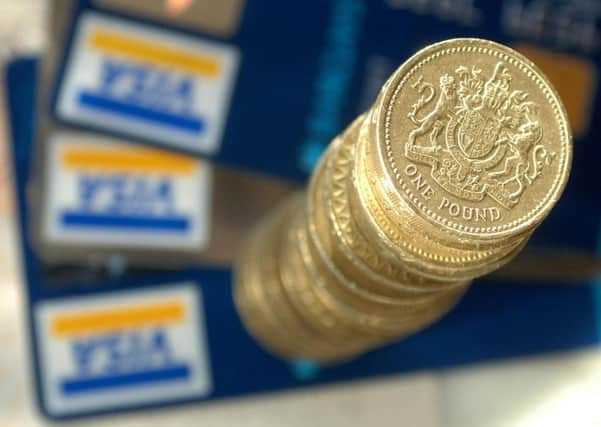Jeff Salway: Getting stung by overdraft charges


‘Careful” bank customers are being hit with steeper penalties for slipping into the red as new fee structures leave more people at risk of charges on agreed overdrafts.
Most of the UK’s main banks and building societies now levy daily and monthly fees for agreed overdrafts, following a clampdown in recent years on excessive charges for unauthorised overdrafts.
Advertisement
Hide AdAdvertisement
Hide AdBut experts say many overdraft structures are now unfair on customers who have agreed overdrafts and typically pay them back on time, with the cost of going only slightly into the red reaching a record high.
The issue was raised as new figures showed a sharp increase in the number of Scots being charged for going into overdraft. More than one in three Scots have been penalised for a scheduled payment bouncing or for slipping into the red, according to Thinkmoney, up from just 20 per cent last October.
Ian Williams, spokesman for thinkmoney, said: “The research shows that free banking is a myth. For millions of people, the free current accounts and basic bank accounts offered by high street banks sting them with unauthorised overdraft charges, daily usage charges, interest charges, or fees for bounced cheques and unpaid direct debits.”
Banks and building societies overhauled their overdraft arrangements following an Office of Fair Trading investigation in 2008 that led to a test case in the Supreme Court the following year. While the banks won that, most changed their approach to overdrafts as pressure mounted on them to reform.
But although fees on unauthorised overdrafts have come down, firms have introduced new charging structures and terms in recent years that have made it difficult to compare different products. Many are “complex and opaque”, the Financial Conduct Authority (FCA) said last year, adding that “even the most astute consumer could struggle to understand what they are paying for”.
Andrew Hagger, personal finance expert at Moneycomms.co.uk, agreed.
“Over the past few years an increasing number of banks and building societies have introduced daily or monthly fees for agreed overdrafts,” he said. “The banks argue that they are easier for customers to understand, which may well be the case, however in many instances they are also far more expensive than the interest rate charges they replaced.”
He used the example of Barclays. Last summer the bank introduced authorised overdraft fees of 75p a day up to £1,000, £1.50 a day up to £2,000 and £3 a day for debit balances over £2,000.
Advertisement
Hide AdAdvertisement
Hide Ad“If someone with Barclays is overdrawn by £500 for seven days they will pay £5.25 in charges (equivalent to interest at 54.75 per cent EAR), whereas on the old tariff of 19.3 per cent they would have been charged £1.85,” said Hagger.
“It’s a very confusing area for consumers with such a wide variation of charging types and makes it nigh on possible to work out which is the most suitable account – hence not enough people switching banks.”
Providers including Royal Bank of Scotland, Lloyds Bank, TSB and Clydesdale Bank all charge £6 monthly planned borrowing fees on top of interest, making their accounts especially expensive for customers who tend to be overdrawn for just two or three days. Several have “buffers” of typically £10 to £25 before customers are charged for being overdrawn, although these are often available only on paid-for accounts.
RBS recently moved thousands of customers to an account with significantly higher charges than they were previously liable to pay if they went into the red.
The industry’s wholesale shift away high unauthorised overdraft charges has proved an expensive one for people who “carefully plan their authorised overdraft and pay it back each month,” said Rachel Springall, finance expert at Moneyfacts.co.uk.
Its research found that 63 per cent on “free” current accounts now charge usage fees on arranged overdrafts, up from just 22 per cent in July 2008.
“Those who have seen their charges rise over the years will be shocked by how much it will now cost to temporarily dip into their authorised overdraft,” said Springall. “The average cost of a high street bank overdraft is now six times higher per month than it was seven years ago, rising from £2 monthly in 2008 to £12 today.”
While ten banks and building societies have made “positive” changes to unplanned usage fees over the past year, said Springall, just three have changed their conditions on agreed overdrafts, all of which have resulted in higher costs.
Advertisement
Hide AdAdvertisement
Hide Ad“Banks have been changing their overdraft structures for a more transparent approach, but this shouldn’t come at a cost to their customers. Sadly, this appears to be the case, as those who arrange their overdraft are taking on the burden of bank customers who don’t plan ahead,” said Springall.